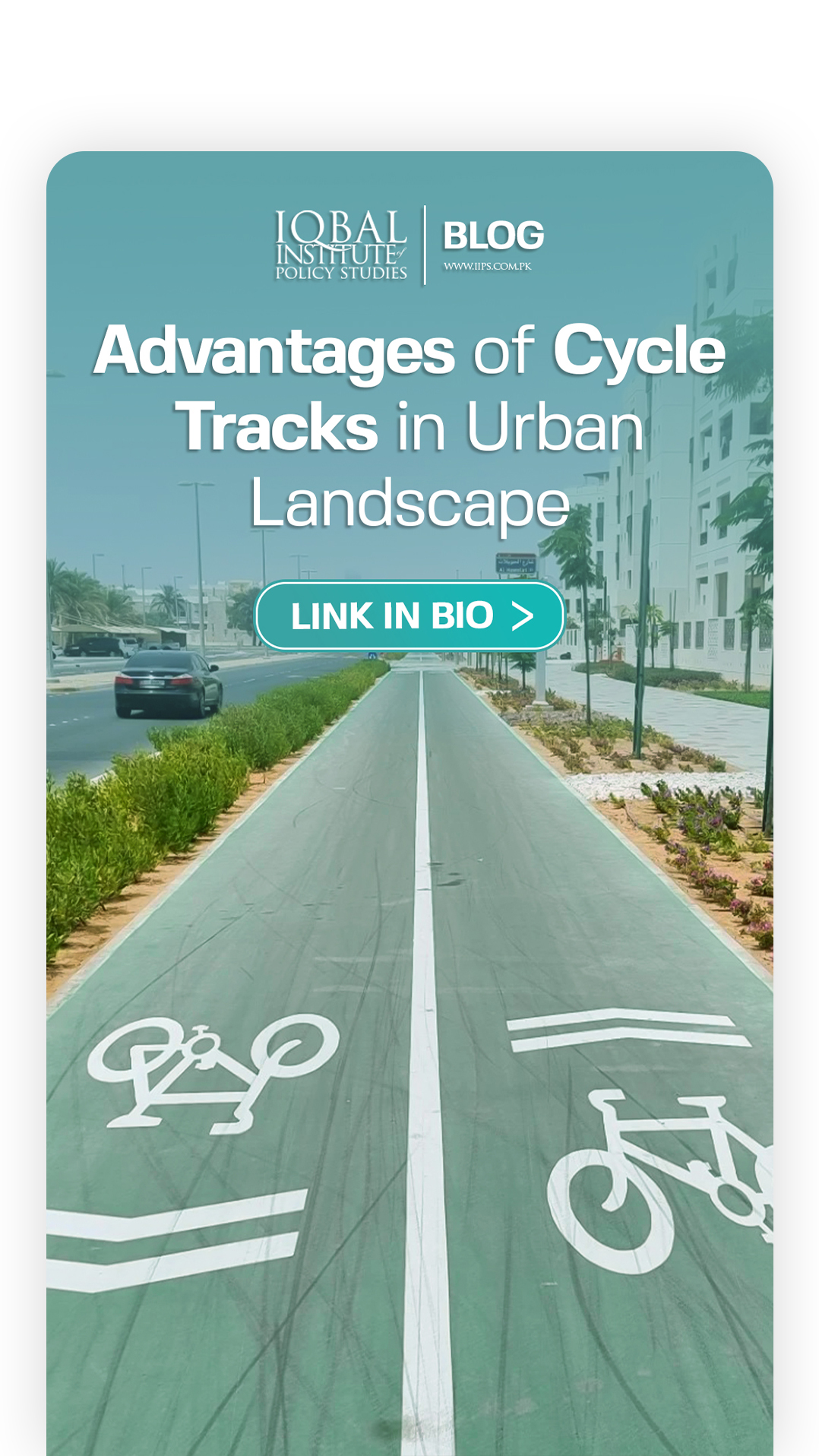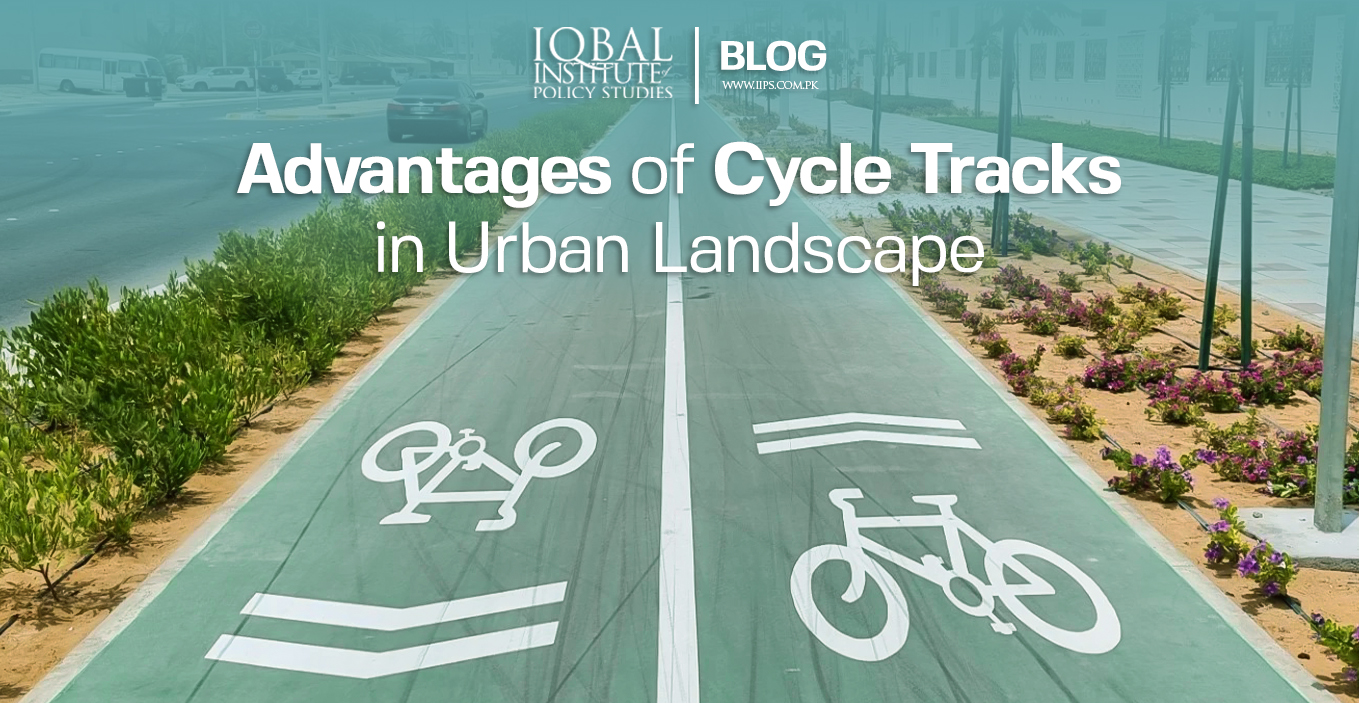Introduction
The Covid-19 pandemic has led to a resurgence in the popularity of cycling and walking. Investments in cycle track infrastructure have become relevant more than ever in the urban landscape. Bike lanes offer several benefits primarily because urban infrastructure is shifting towards building sustainable cities. Modern urban development is focused on promoting a healthy lifestyle by seeking ways to reduce traffic congestion, improve air quality, and mitigate the heat island effect. The inclusion of sustainable modes of transportation, such as bicycles and e-bikes, is essential to improving the overall environment of cities. However, a lack of designated tracks for cycling makes it impractical to go around town on a bicycle as a matter of routine. The inclusion of cycle tracks in urban landscape and road infrastructure will reduce the road safety hazards which result in injuries and mortalities.
This blog by the Iqbal Institute of Policy Studies will discuss the advantages of cycle tracks in an urban landscape in detail.
Environmentally Friendly
Cycling is an eco-friendly transportation option to reduce the number of cars on the road. Transportation accounts for the emission of a great proportion of greenhouse gasses, largely responsible for environmental degradation. Bicycles are the most environmentally friendly mode of transportation. Apart from occasional recreational activities, using the bicycle for shorter commutes can considerably decrease the carbon output of vehicles. Moreover, using bicycles as means of transportation can help reduce air pollution. The gasoline emissions from vehicles are one of the main sources of air pollution. As cycling does not require gasoline, harmful vehicle emissions can be avoided. These emissions are responsible for smog, airborne diseases and receding air quality. A conscious decision to use a bicycle is the simplest way to reduce one’s environmental footprint. Separate cycling tracks will reduce road congestion and make the sidewalks safer for walking. Thus, maximizing the interaction of people with space and making the roads functional for walking, running, and cycling.
Healthy Lifestyle
The development of cycle tracks creates a sense of safety for those who opt to use cycling as a mode of transportation. Bicycles cut down on fuel costs and offer the riders an additional benefit of exercise. Cycling is a full-fledged physical activity that can help reduce depression by releasing endorphins, decreasing the chances of diabetes, preventing cardiovascular diseases, and helping maintain normal blood pressure. The benefits of including exercise in daily routine are indisputable. An extensive history of research into the correlation of exercise and mental health has consistently linked it to releasing endorphins that enhance positivity and well-being. Regular cycling ensures an active lifestyle and gives you the opportunity to take your mind off daily stresses. Proper cycling tracks will be beneficial for working individuals who will have the option to skip the daily traffic in the morning and reach their workplace on time.
Reduces traffic congestion
For working individuals, the commuting costs are the main cost to keep aside while budgeting. The long commuting distances result in a large sum of hard-earned money being spent on fuel costs. Moreover, an increasing number of vehicles on road are causing road congestion and wasting valuable time and fuel in traffic jams. An investment in public transport system can mitigate traffic congestion issues but this will take time and resources for proper implementation. Cycle tracks are the probable solution to reduce traffic congestion and promote road safety. In urban areas, an increase in the number of cycle tracks can accommodate 7 to 12 times as many people per meter of lane. The result of fewer cars on the road is a reduction in traffic congestion and a pleasant commute for cyclists, drivers, and pedestrians.
Cost-Effective
Cycling is cost-effective as the maintenance and fuel costs compared to a fuel-driven vehicle are exempted. To quantify the benefits of cycling, different variables can be taken into consideration such as vehicle cost savings, fuel cost savings and parking cost savings. Moreover, cycling reduces air pollution which results in better overall health and vicariously saves medical costs. Cycling is beneficial for energy conservation, traffic safety improvements and congestion reduction. Separate cycling tracks will make the commute safer and shift the two-tyre traffic from the road to the cycle lanes. Considering the abysmal state of public transport in Pakistan, cycling is a comparatively cheaper mode of transport. By cutting down the monthly fuel and maintenance costs, a person can save a large chunk of money that could be utilized for other purposes. This makes the construction and development of cycle tracks eminent in the urban landscape.
Conclusion
Cycling is a healthy sport, but it can also be an effective mode of transport providing several benefits. The COVID-19 pandemic has reinforced the importance of environmental action. Cycling tracks are necessary to promote cycling as a mode of daily commute especially for travelling shorter distances. Cycles do not require fuel which reduces the carbon emissions and environmental footprint of fuel-based vehicles. The increasing number of vehicles has resulted in traffic congestion, air pollution and noise pollution. Separate tracks for cycling will reduce the traffic on roads by shifting the 2-wheel vehicles on the cycle track. Currently, weekly cycling activities are conducted in Islamabad by private companies like Graana.com, to promote a healthy lifestyle. After the CDA’s announcement of making cycle lanes in Islamabad, the awareness of the benefits of cycling as a mode of transport has become important. Separate cycle tracks will symbolize the importance of cycling as a healthy activity and also as a mode of transport.



Leave a Reply